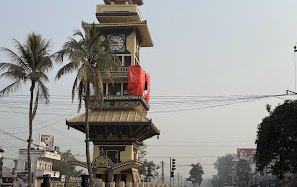
The Government of Nepal has finally constituted a Board to take responsibility for the development of infrastructure of the proposed University of Nepal (UoN), as per the University ofNepal Infrastructure Development Preparation Board Constitution Order, issued by the Council of Ministers on April 2, 2021. The 15-member Board constitutes of academics and professionals, including four ex-officio members from different levels of government, who were active in pursuing such a public university with their initiation and support.
With the constitution of the Board, on 14th June, the Government has approved the opportunity to the academics and professionals who had been calling for the establishment of a university at Gaindakot, Nawalparasi for the last four years with their own initiative. Despite the existence of many universities in the country, these academics and professionals aimed to create a high-quality, autonomous liberal arts university– something that many people believe has become absolutely necessary to rectify existing gaps and shortcomings in the higher education of Nepal.
As a liberal arts university, the proposed University of Nepal’s education and academic efforts will be geared towards exploring the truth, in-depth study of the interdependent relationship between the individual, society and nature, creation of new knowledge and practice of multidisciplinary genres to meet the present and future challenges of the country and the world and seizing opportunities in this regard. This liberal arts education will help creating a group of citizens and leaders who are able to compete globally, lead efficiently in the positive transformation of our society and nation, carry social responsibility and be prudent, efficient, loyal, creative, innovative, enterprising and critically-minded.
This education will provide an international standard of higher education in humanities, arts, social science, science, technology, management, and other departmental fields for the purpose of achieving all-around development and prosperity for Nepal. These qualities are an absolute necessity in Nepal, which is yet to employ liberal arts in the nation-building process. Moreover, the University looks to collaborate with leaders who possess integrity, excellence, and passion to establish its foundations in various different fields. Politics and political affiliation will not sway the University’s mission, and a capable and passionate individual will find a place at the University should they wish to help establish its components.
The University’s Board Constitution Order enables the Board to work and create infrastructure in five major areas for the next two years. Firstly, the Board will have to prepare a master plan of the university complex and its structure at Gaindakot, build offices required for running a university, laboratories, study rooms, dormitories, teachers and staff residence, libraries, information technology or research center buildings, guest houses, workshops, open areas, playgrounds and garbage dump sites. Secondly, the Board will have to finalize academic programmes and possible schools or departments that will be launched in the initial years of the university, priority research areas, student admission policy and necessary human resources.
Thirdly, and as a major intervention, the Board will have to finalize cooperation with international academic institutions and faculties to ensure quality education in Nepal. This will require collaborations with international academic institutions, including through student and teacher exchange programs, short- or long-term visitations of foreign teachers and collaborations between research institutions. Fourthly, while the land to be given by the government for the use of the university has already been identified, the Board will have to work with the government to fix its boundaries and establish the details of users’ rights of the university over the land as quickly as possible. Finally, the Board must assist the government to pass a University of Nepal Act through the Parliament by June 2023 to transform the present Board into a statutory university with all paraphernalia of a modern academic institution.
As such, in addition to the specific tasks, duties and powers mentioned elsewhere in the Constitution Order, Section 6 states the general tasks of the Board as follows:
a) to buy or coordinate with the Government of Nepal to acquire land for the purpose of building physical infrastructures necessary to run a university such as administrative offices, class rooms, laboratories, student hostels or dormitories, residential facilities for the faculty and the staff, library, guest house, open spaces, play grounds, waste/sewerage management system;
b) to develop a detailed project plan report for the purpose of physical and academic infrastructure required for the University;
c) to build the physical and institutional infrastructure of the University;
d) to complete the environmental impact assessment as per the existing law while building the infrastructure as mentioned in (c);
e) to prepare the list of the departments, faculty, or schools that are considered necessary for running the courses or conducting research in the University;
f) to enlist the required equipment and prepare the academic curricular framework that will eventually have to be approved by the concerned body of the University;
g) to formulate the policy for the recruitment of students and faculty;
h) to prepare and submit to the Government of Nepal a draft bill required for the establishment of the (proposed) university and provide needed input and advice to the Government in this matter;
i) to prepare and approve the annual plan, program and budget of the Board;
j) to consult and take suggestions and help from Provincial Government, local municipality, elected political representatives, local civil society/community and other stakeholders in the matters related to the development of the University;
k) to conduct seminars, workshops and talk programs in the area of establishment and running of the university (including the academic programs) as well as academic development and innovation; and
l) to undertake and/or perform any other relevant activities that are necessary for the establishment of the University.
These general tasks demonstrate that the Board will have a very challenging two-year term. Creating an institution from the ground up and standardizing it within two years is certainly challenging work for the Board and its members. Behind the Board, there is a pool of more than one hundred national and international experts who have teamed up as promoters of the university of the liberal arts and are enthusiastic to contribute. However, the challenge does not become minimized because of this. While the proposed UoN is a public university and budgetary support is expected from the Governments at all levels, including the Gaindakot Municipality, the level of their support is yet to be seen. When Finance Minister Bishnu Prasad Paudel presented the annual budget on 29th May, he indicated very clearly that the Government of Nepal is going to support the UoN initiative as a policy and programme of the Government. The Government of Gandaki Province, where the University is to be established, has also assured that it will support the initiative of the academics and professionals.
Although the Gaindakot Municipality, which has been supporting the initiative from the very beginning, is not a revenue-rich municipality, it has assured the promotors of its yearly budgetary contribution. There is enough indication that the Gaindakot Municipality, with its commitment to develop as a knowledge city, will continue to support the University with everything that local resources will permit. The presence of four ex-officio members in this Board representing the Federal Government (Ministries of Finance and Education), the Provincial Government (Gandaki) and the Local Government (Gaindakot Municipality) will certainly add value to this approach. They can be the bridge for the Board to reach the respective governments for their support and assistance. Even with this combined strength, the ambition that the Board has set for itself requires an enormous investment, including raising funds from all potential non-governmental sources.
Aside from the funding allocated to the establishment of the University through the local, provincial and federal governments, the Board is further expected to seek opportunities for alternative sources of funding for its massive commitment. The foremost issue to confront when it comes to finances is ensuring the autonomy of this institution. Various universities of Nepal have come under fire due to the sway of internal politics and influence as well as the will of powerful political actors. These factors have worked to erode the public’s trust as well as the academic integrity of higher education in Nepal. At the University of Nepal, the Board is expected to be committed to upholding the autonomy of the institution, regardless of who the donors, whether governmental or otherwise, are. The Board is expected to do so by ensuring (1) transparency and accountability of all financial and other workings of the University throughout the fundraising process and (2) participation of relevant and affected stakeholders in the decision-making process. These principles will definitely guide the Board in retaining public trust in both the leaders as well as the academic integrity of the institution.
The need to develop alternative strategies for fund-raising in education has become an issue that is now receiving widespread attention throughout the world of education. The Chairperson of the Board and its members are working pro bono for the public cause and will not claim any compensation for their work. The Constitution Order is very clear about it. Rather, many of the promoters, including Board members, are interested as first-row individuals in donating whatever is possible in their capacity to the new initiative. A University cannot expect third parties to invest until those who are closest to it lead by example. This act will showcase the character of the new university and give it a distinct standing in the comity of Nepal’s universities and institutions of higher learning.
A university development plan in the form of strategic planning is one of the quickest tasks the Board will have to complete. This development plan will specify the amount of funding required for the next few years to achieve the intended development in academics and physical infrastructural developments. An exact scenario will enable the Board to appeal to Nepalese and international communities for crowd funding. It may come as a surprise to many Nepalese that private generosity is being called on even to establish a university. Such a tradition existed in Nepal until a few decades before but has fizzled out once the government began stepping forward with public fund committal.
The need to reach out to the members of the Nepalese business sector, professionals, academicians and others for the public good and the betterment of university education is going to be an almost uniquely distinctive trait of the University of Nepal. International donors will also be mobilized for this purpose. Donors provide support to meet their objectives, not simply to give money away. This requires an adequate level of understanding between the donors and the institution, and their involvement sought in the planning and policy exercises as observers or development partners. However, as mentioned previously, the University of Nepal will not compromise its objectives and mission in service of a donor’s agenda and will work to collaborate with partners with whom the University aligns in terms of values.
In all these instances, the higher the organizational integrity of the Board and the university it will be transformed into, the more likely it is that the fund-raising outcomes will be successful. There is no option for failure in this move.

Dr. Bipin Adhikari
Dr Adhikari is a senior constitutional expert and the founding dean of the Kathmandu University School of Law). He can be reached at [lawyers_inc_nepal@yahoo.com]
- Belt And Road: No Belt, No Road – The Stalled Journey In Nepal
- Oct 26, 2023
- On The Belt And Road Cooperation And Partnership 'Model Agreement'
- Oct 17, 2023
- Insight Into The Political Economy Of Nepal’s Development
- May 27, 2021
- Preliminary Part Of Padma Shamsher's Government Of Nepal Act, 1948
- May 04, 2020
- State Of Nepal’s Economy And Development Prior To The Introduction Of Padma Shamsher's Constitution
- Apr 20, 2020















